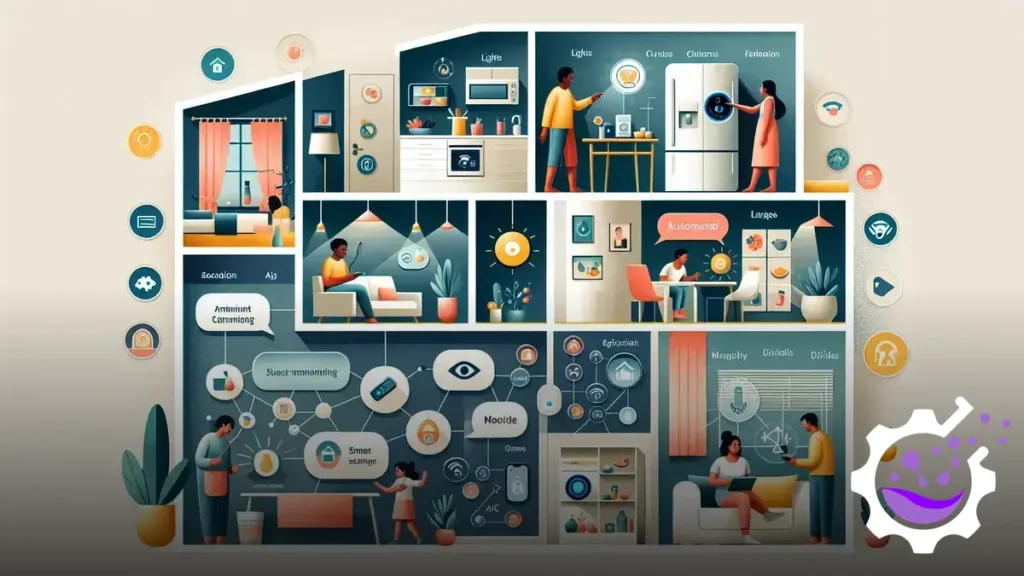Smart Homes have transformed the way we live, offering an unprecedented level of convenience and efficiency. From automated lighting and climate control to voice-activated virtual assistants, smart home technology has revolutionized the modern living experience. These integrated systems not only make daily tasks easier but also contribute to energy savings and enhanced home security. However, as the future of smart homes continues to evolve, the focus shifts towards seamless integration and robust security measures. With the increasing interconnectedness of devices, ensuring the protection of personal data and privacy becomes paramount. As smart homes become more prevalent, the need for comprehensive security measures will be crucial to fully capitalize on the potential benefits of this innovative technology.
Key Takeway
- Smart homes offer convenience and efficiency
- Integration of smart devices simplifies daily tasks
- Enhanced security and safety features
- Energy savings and environmental benefits
- Potential for future growth and innovation

Smart Homes Enhance Convenience and Efficiency
Smart homes have revolutionized the way we live, offering a level of convenience and efficiency that was once only a dream. With the advancement of technology, our homes have become intelligent, allowing us to control various aspects of our living environment with just a few taps on our smartphones or voice commands.
One of the key benefits of smart homes is the convenience they provide. Imagine being able to control your lights, thermostat, and security system from anywhere in the world. Whether you’re at work, on vacation, or simply lounging on the couch, you have complete control over your home. No more worrying if you left the lights on or forgot to lock the door – with a smart home, you can easily check and take action.
Smart homes also enhance efficiency by optimizing energy usage. With smart thermostats, for example, you can program your heating and cooling systems to adjust automatically based on your preferences and schedule. This not only saves energy but also reduces your utility bills. Additionally, smart appliances such as refrigerators and washing machines can be programmed to operate during off-peak hours, further reducing energy consumption.
Another aspect where smart homes excel is in home security. With smart security systems, you can monitor your home 24/7, receive instant alerts in case of any suspicious activity, and even remotely lock or unlock doors. This level of control and peace of mind is invaluable, especially in today’s world.
Smart homes also offer a seamless integration of devices and systems. With the Internet of Things (IoT) technology, all your devices can communicate and work together to make your life easier. For example, you can set up routines where your lights automatically turn on when you enter a room, your coffee maker starts brewing when your alarm goes off, and your blinds open at sunrise. The possibilities are endless, and the convenience is unparalleled.
Furthermore, smart homes can adapt to your lifestyle and preferences. They can learn your habits and adjust settings accordingly. For instance, if you typically come home from work at 6 p.m., your smart home can ensure that the temperature is set to your liking and the lights are on when you arrive. This level of personalization adds a touch of luxury to everyday life.
In conclusion, smart homes have transformed the way we live, offering convenience, efficiency, and security. With the ability to control various aspects of our homes remotely and seamlessly integrate devices, smart homes have become an essential part of modern living. Embracing this technology can enhance our daily lives and make our homes truly intelligent.
The Future of Smart Homes: Integration and Security
In today’s fast-paced world, technology continues to advance at an astonishing rate. One area that has seen significant growth is the development of smart homes. These intelligent homes are equipped with various devices and systems that can be controlled remotely, making our lives more convenient and efficient. As we look to the future, the integration and security of smart homes will play a crucial role in shaping this rapidly evolving industry.
Integration: The Key to Seamless Automation
One of the most exciting aspects of smart homes is the ability to integrate different devices and systems, creating a seamless automation experience. Imagine waking up in the morning, and as you step out of bed, the lights automatically turn on, the blinds open, and your favorite music starts playing. This level of integration is made possible through the use of interconnected devices and intelligent algorithms.
Smart home integration goes beyond just controlling lights and music. It extends to various aspects of our daily lives, such as security, energy management, and even healthcare. For example, a smart home security system can be integrated with motion sensors, cameras, and door locks, providing a comprehensive and reliable security solution. Similarly, energy management systems can optimize energy usage by integrating with smart thermostats, lighting controls, and appliances.
Security: Protecting Your Connected Home
With the increasing number of devices connected to the internet, security becomes a paramount concern for smart homes. While the convenience and automation offered by these homes are undeniable, they also present new vulnerabilities that can be exploited by hackers and cybercriminals. Therefore, ensuring the security of smart homes is crucial to protect our privacy and prevent unauthorized access.
Smart home security starts with securing the devices themselves. Manufacturers need to prioritize security by implementing robust encryption, regular firmware updates, and strong authentication mechanisms. Additionally, users should be educated about the importance of strong passwords, network security, and the risks associated with connecting insecure devices to their smart home systems.
Furthermore, the integration of artificial intelligence and machine learning can enhance smart home security. These technologies can analyze patterns and detect anomalies in device behavior, alerting homeowners to potential security breaches. By constantly adapting and learning, these systems can provide a proactive defense against emerging threats.
The Role of Standards and Regulations
As the smart home industry continues to grow, the need for standards and regulations becomes increasingly important. Standardization ensures interoperability between different devices and systems, allowing for seamless integration and a better user experience. It also promotes competition and innovation, as manufacturers can focus on improving their products rather than reinventing the wheel.
Regulations, on the other hand, help protect consumers by setting minimum security requirements and ensuring compliance with privacy laws. They also provide a framework for liability and accountability in case of security breaches or data breaches. By establishing clear guidelines, regulations can foster trust and confidence in smart home technology.
In Conclusion
The future of smart homes is undoubtedly exciting, with integration and security playing pivotal roles in shaping this evolving industry. As technology continues to advance, we can expect even greater integration between devices and systems, creating a truly connected and automated living experience. However, it is essential to prioritize security and establish standards and regulations to protect users and ensure the widespread adoption of smart home technology.
Frequently asked questions
What are smart homes?
Smart homes are residences that use internet-connected devices to enable the remote monitoring and management of appliances and systems, such as lighting, heating, and security.
How do smart homes work?
Smart homes utilize sensors, cameras, and Wi-Fi connectivity to collect data and allow homeowners to control their devices from their smartphones or other devices.
What are the benefits of smart homes?
- Convenience
- Energy efficiency
- Enhanced security
- Customization
Are smart homes secure?
Smart homes must be secured with strong passwords, encrypted networks, and regular software updates to prevent hacking and unauthorized access.
Are smart homes expensive to set up?
While initial setup costs can be high, the long-term savings from energy efficiency and potential insurance discounts make smart homes a worthwhile investment.

This article was crafted by our advanced content creation tool. Want to produce similar high-quality content effortlessly? Get your hands on our tool today at AutomatikLabs

